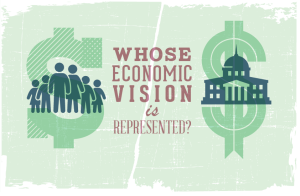Professor of Economics
Berry Chair for Free Enterprise at Cedarville University
When it comes to opinions on our nation’s economy, there are two opposing visions. One casts the United States as a nation based on free enterprise with minimal government involvement in business affairs. The other casts the United States as a nation where business and citizens are more and more dependent on the government’s involvement in their economic affairs. As citizens, we need to be aware of our personal economic vision, understand the economic vision of our current leaders, and determine if the leaders’ vision aligns with ours.
In the first State of the Union address for his second term, President Obama said, “It is our unfinished task to make sure that this government works on behalf of the many, and not just the few; that it encourages free enterprise, rewards individual initiative, and opens the doors of opportunity to every child across this great nation.” While this statement suggests that Obama supports a vision of free enterprise, let’s examine some of his statements about economic policy in the rest of the speech to see if his proposals match this vision.
The President referred to “deficit reduction” on more than one occasion. We must not only reduce the deficit, but also institute policy that reduces the ratio of the amount of debt to the size of the economy. For this to happen, we must allow the economy to grow at a much quicker pace. We need pro-business policy at the federal level to encourage entrepreneurship. Obama wants to encourage business with the “American Jobs Act” — a combination of tax credits and additional spending — essentially more “stimulus” consistent with a vision of government involvement in our economy.
He advocated “the launch of three more … manufacturing hubs, where businesses will partner with the Departments of Defense and Energy to turn regions left behind by globalization into global centers of high-tech jobs. And I ask this Congress to help create a network of 15 of these hubs and guarantee that the next revolution in manufacturing is ‘Made in America.’” The President is proposing that the government influence the type of business that American entrepreneurs start. The federal government has no particular expertise at choosing successful business ventures, and establishing manufacturing hubs is consistent with a government-directed economy.
Obama aspires to “use some of our oil and gas revenues to fund an Energy Security Trust that will drive new research and technology to shift our cars and trucks off oil for good.” We will move away from oil as a fuel only when there are cheaper alternatives. Forcing people and industries to change in order to eliminate gasoline as a fuel will take money from other parts of the economy, starving other business where resources should be invested. This bit of social engineering is consistent with an interventionist economic vision.
Obama’s words and actions show that his economic vision is heavily dependent on government. Our nation was founded on the alternative economic vision of freedom, accountability, and responsibility for ourselves and others. To effectively participate in our representative democracy, we need to think through our personal economic vision and speak up to ensure our vision is represented.
Dr. Bert Wheeler is a Professor of Economics and the Berry Chair for Free Enterprise at Cedarville
This article first appeared in the spring 2013 issue of Cedarville Magazine and is reprinted with permission. cedarville.edu/magazine
Illustration credit: Joshua Redmond

 Bert Wheeler
Bert Wheeler
 Jeff Haymond
Jeff Haymond
 Marc Clauson
Marc Clauson
 Mark Caleb Smith
Mark Caleb Smith
 Tom Mach
Tom Mach